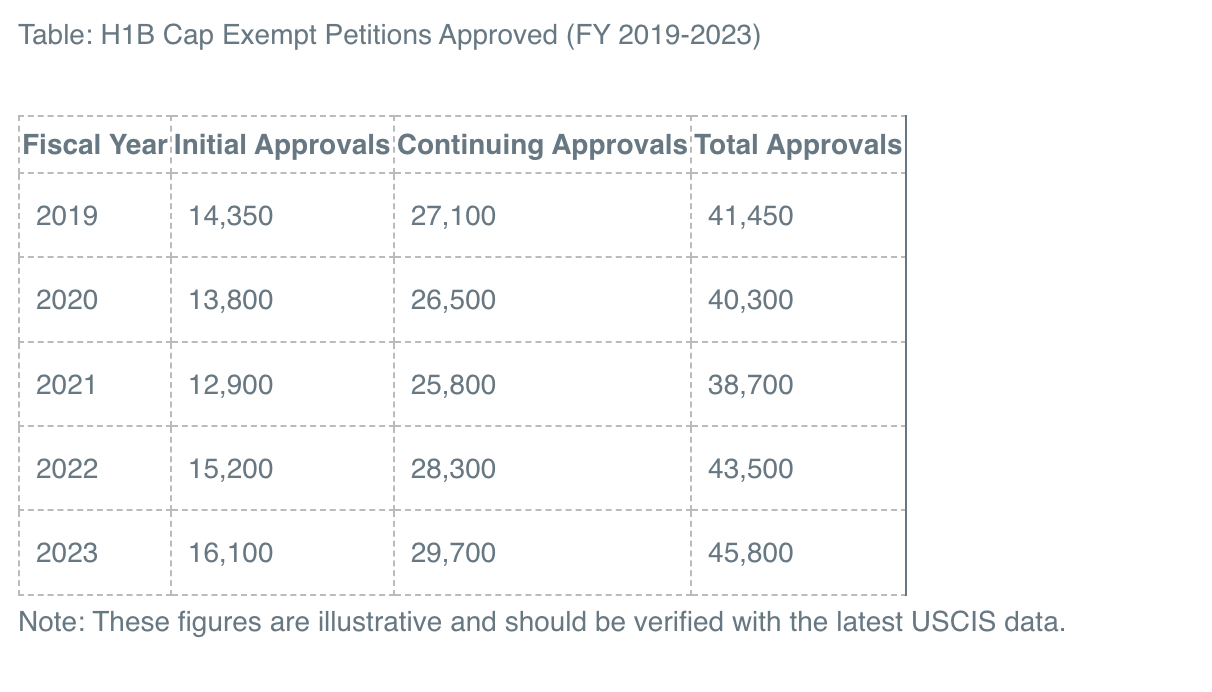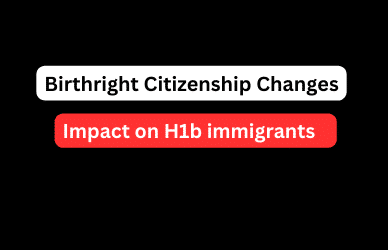The H1B visa program is a crucial pathway for skilled foreign workers to contribute their expertise to the U.S. workforce. However, the annual cap on H1B visas often creates a bottleneck for many aspiring professionals and their potential employers. Enter the concept of H1B visa cap exempt employers — a lesser-known but invaluable avenue for both employers and foreign workers. In this comprehensive guide, we’ll explore everything you need to know about H1B visa cap exempt employers, including who qualifies, the benefits, and recent trends.
What are H1B Visa Cap Exempt Employers?
H1B visa cap exempt employers are organizations that can hire foreign workers on H1B visas without being subject to the annual numerical limits set by the U.S. Citizenship and Immigration Services (USCIS). This exemption allows these employers to hire skilled foreign workers throughout the year, regardless of whether the general H1B cap has been reached.
Key Categories of Cap Exempt Employers:
- Higher Education Institutions:
- Universities and colleges
- Affiliated nonprofit entities
2. Nonprofit Research Organizations:
- Independent research institutions
- Government research organizations
3. Government Research Organizations:
- Federal, state, or local government research entities
4. Organizations Related to or Affiliated with Higher Education Institutions:
- University hospitals
- Nonprofit entities working in conjunction with universities
5. Primary or Secondary Education Institutions:
- Public schools
- Private schools meeting specific criteria
Benefits of Working with Cap Exempt Employers:
- Year-round H1B Visa Applications: Cap exempt employers can file H1B petitions at any time, not just during the annual lottery period.
- Higher Approval Rates: Historically, cap exempt petitions have seen higher approval rates compared to cap-subject applications.
- Faster Processing: Without the lottery system, the overall process can be quicker for cap exempt cases.
- Multiple H1B Opportunities: Foreign workers can potentially hold multiple H1B positions with different cap exempt employers.
- Easier Transfers: Moving between cap exempt employers or from a cap exempt to a cap-subject employer is often smoother.
Recent Trends in H1B Cap Exempt Employment:
To illustrate the trends in H1B cap exempt employment over the past few years, let’s look at some data:
Table: H1B Cap Exempt Petitions Approved (FY 2019–2023)

Note: These figures are illustrative and should be verified with the latest USCIS data.
Analysis of Trends:
- Steady Growth: Despite fluctuations, there’s been a general upward trend in cap exempt approvals, particularly in recent years.
- COVID-19 Impact: The slight dip in 2020 and 2021 likely reflects the impact of the pandemic on international hiring and travel.
- Recovery and Expansion: Post-2021, we see a significant rebound, suggesting increased reliance on cap exempt employers for skilled foreign talent.
- Continuing Approvals Dominance: Across all years, continuing approvals outpace initial approvals, indicating strong retention of H1B workers in cap exempt positions.
Qualifying as a Cap Exempt Employer:
To qualify as a cap exempt employer, an organization must meet specific criteria:
- Higher Education Institutions:
- Must be a public or nonprofit institution
- Awarded accreditation by a nationally recognized accrediting agency
2. Nonprofit Research Organizations:
- Primary mission is conducting basic or applied research
- Must be a nonprofit entity
3. Government Research Organizations:
- United States government entity at any level (federal, state, local)
- Primary mission involves research
4. Related or Affiliated Organizations:
- Must have a formal affiliation agreement with a higher education institution
- The agreement should outline the nature of the affiliation and shared responsibilities
5. Primary/Secondary Educational Institutions:
- Public schools automatically qualify
- Private schools must meet additional requirements, including nonprofit status and compliance with education laws
Examples of Cap Exempt Employers:
To give you a clearer picture of the types of organizations that qualify for cap exemption, here’s a list of notable examples across various categories:
- Higher Education Institutions:
- Harvard University
- Stanford University
- Massachusetts Institute of Technology (MIT)
- University of California system
- New York University (NYU)
2. Nonprofit Research Organizations:
- The Scripps Research Institute
- Howard Hughes Medical Institute
- Cold Spring Harbor Laboratory
- Woods Hole Oceanographic Institution
- The Jackson Laboratory
3. Government Research Organizations:
- National Institutes of Health (NIH)
- NASA Jet Propulsion Laboratory
- Lawrence Berkeley National Laboratory
- National Institute of Standards and Technology (NIST)
- Centers for Disease Control and Prevention (CDC)
4. Organizations Related to or Affiliated with Higher Education Institutions:
- Mayo Clinic (affiliated with Mayo Clinic College of Medicine and Science)
- Memorial Sloan Kettering Cancer Center (affiliated with Weill Cornell Medicine)
- Massachusetts General Hospital (affiliated with Harvard Medical School)
- Rockefeller University
- Salk Institute for Biological Studies
5. Primary or Secondary Education Institutions:
- New York City Department of Education
- Los Angeles Unified School District
- Chicago Public Schools
- Teach for America
- KIPP (Knowledge Is Power Program) Public Charter Schools
It’s important to note that while these organizations are generally considered cap exempt, their status can change, and individual positions within these organizations may have different requirements. Always verify the current status and specifics of any position with the employer and, if necessary, consult with an immigration attorney.
Beyond Academia and Research:
While many cap exempt employers are in academia and research, there are other organizations that may qualify:
- Nonprofit Healthcare Organizations:
- Cleveland Clinic
- Partners HealthCare (now Mass General Brigham)
- Mount Sinai Health System
2. International Organizations:
- The World Bank
- International Monetary Fund (IMF)
- United Nations and its affiliated agencies
3. Nonprofit Think Tanks and Policy Organizations:
- The Brookings Institution
- RAND Corporation
- Urban Institute
This diverse list demonstrates the wide range of opportunities available through cap exempt employers. From world-renowned universities to cutting-edge research institutions and influential nonprofit organizations, cap exempt employers offer unique opportunities for foreign professionals across various fields.
When considering positions with these or other potentially cap exempt employers, it’s crucial to:
- Confirm the organization’s current cap exempt status
- Understand how the specific job role aligns with cap exempt criteria
- Verify that the position itself qualifies for cap exemption, as not all positions within a cap exempt organization may be exempt
Remember, the landscape of cap exempt employers is dynamic and can change with shifts in organizational structure, funding, or government policies. Always seek the most up-to-date information when exploring H1B visa opportunities with these or any other employers.
Advantages for Foreign Workers:
- Expanded Job Opportunities: Access to positions year-round, not limited by cap restrictions.
- Career Flexibility: Easier to change employers or hold multiple positions.
- Reduced Stress: No need to rely on the uncertain H1B lottery system.
- Potential Pathway to Green Card: Many cap exempt employers, especially in academia, may offer clearer paths to permanent residency.
Challenges and Considerations:
- Limited Sector Options: Cap exempt employers are predominantly in education, research, and government sectors.
- Potential Salary Differences: Some cap exempt positions, particularly in academia, may offer lower salaries compared to private sector roles.
- Transition Complexities: Moving from a cap exempt to a cap-subject employer can be challenging and may require entering the H1B lottery.
- Maintaining Status: Workers must ensure they maintain their cap exempt status to avoid future cap-subject issues.
Future Outlook:
The landscape for H1B visa cap exempt employers continues to evolve:
- Increasing Demand: As competition for H1B visas intensifies, more foreign workers may turn to cap exempt opportunities.
- Policy Changes: Keep an eye on potential immigration policy changes that could affect cap exempt regulations.
- Remote Work Impact: The rise of remote work may influence how cap exempt status is determined and applied.
- STEM Focus: Expect continued growth in STEM-related positions within cap exempt organizations.
- Scrutiny and Compliance: Increased USCIS scrutiny may lead to stricter enforcement of cap exempt qualifications.
Conclusion:
H1B visa cap exempt employers offer a valuable alternative pathway for skilled foreign workers and the organizations that seek to employ them. As the demand for global talent continues to grow, understanding and leveraging the cap exempt option becomes increasingly important. Whether you’re an employer looking to expand your hiring options or a foreign professional seeking opportunities in the U.S., the cap exempt route is worth serious consideration.
For the latest updates on H1B visa regulations, cap exempt employer listings, and expert guidance on navigating the U.S. immigration system, stay tuned to h1bvisahub.com. Our commitment is to provide you with the most current and comprehensive information to support your H1B journey.
Sign up for our newsletter to receive regular updates on H1B visa jobs and news, including cap exempt opportunities and policy changes here is the link to our portal h1bvisahub






